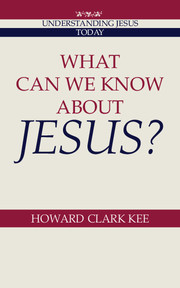Book contents
- Frontmatter
- Contents
- Introduction: Knowing Jesus and Knowing about Jesus
- 1 What Can We Learn from Sources Outside the New Testament?
- 2 What Can We Learn from Early Christian Writings Outside the Gospels?
- 3 What Can We Learn from the Oldest Gospel Source?
- 4 What Can We Learn from Our Oldest Gospel?
- 5 What Can We Learn from the Other Gospels?
- Conclusion
- Questions for Exploration
- Suggestions for Further Reading
- Index
2 - What Can We Learn from Early Christian Writings Outside the Gospels?
Published online by Cambridge University Press: 05 June 2012
- Frontmatter
- Contents
- Introduction: Knowing Jesus and Knowing about Jesus
- 1 What Can We Learn from Sources Outside the New Testament?
- 2 What Can We Learn from Early Christian Writings Outside the Gospels?
- 3 What Can We Learn from the Oldest Gospel Source?
- 4 What Can We Learn from Our Oldest Gospel?
- 5 What Can We Learn from the Other Gospels?
- Conclusion
- Questions for Exploration
- Suggestions for Further Reading
- Index
Summary
Having examined the non-Christian sources for knowledge of Jesus, are there resources other than the Gospels to which we can turn in our search? Because, as we shall see, the Gospels were written beginning in the last third of the first century, we may ask if there are earlier Christian writings that provide us information about the historical figure of Jesus. Or are there materials produced after the Gospels were written that give access to important information that supplements or corrects what the Gospels convey?
Our quest for Christian sources that predate the Gospels leads us first to Paul, since his letters are the oldest documents preserved in the New Testament and therefore are our most ancient Christian sources. In addition to information from the letters of Paul, we shall also briefly consider similar traditions about Jesus from other early Christian literature, both within and outside the New Testament, before we turn in Chapters 3 and 4 to an analysis of the Gospels and their sources. Careful scrutiny of the nongospel evidence shows that there is an important confirmation of details, even though some of the major features of the gospel tradition about Jesus are only rarely mentioned or are given no place at all in these other writings. Accordingly, traditions about Jesus from Christian sources within and outside the New Testament that provide supplemental information must be evaluated on their own merits.
- Type
- Chapter
- Information
- What Can We Know about Jesus? , pp. 15 - 34Publisher: Cambridge University PressPrint publication year: 1990



